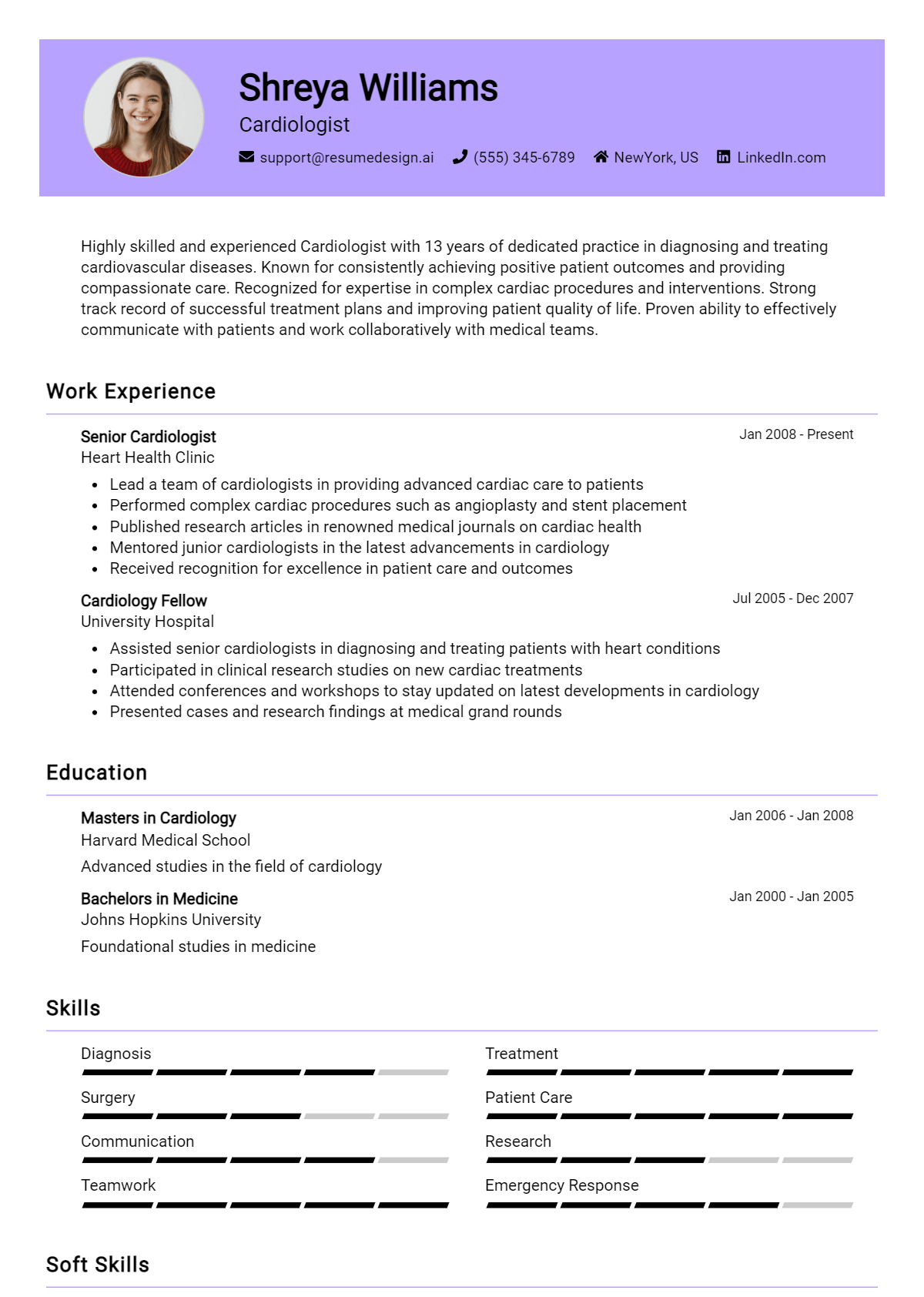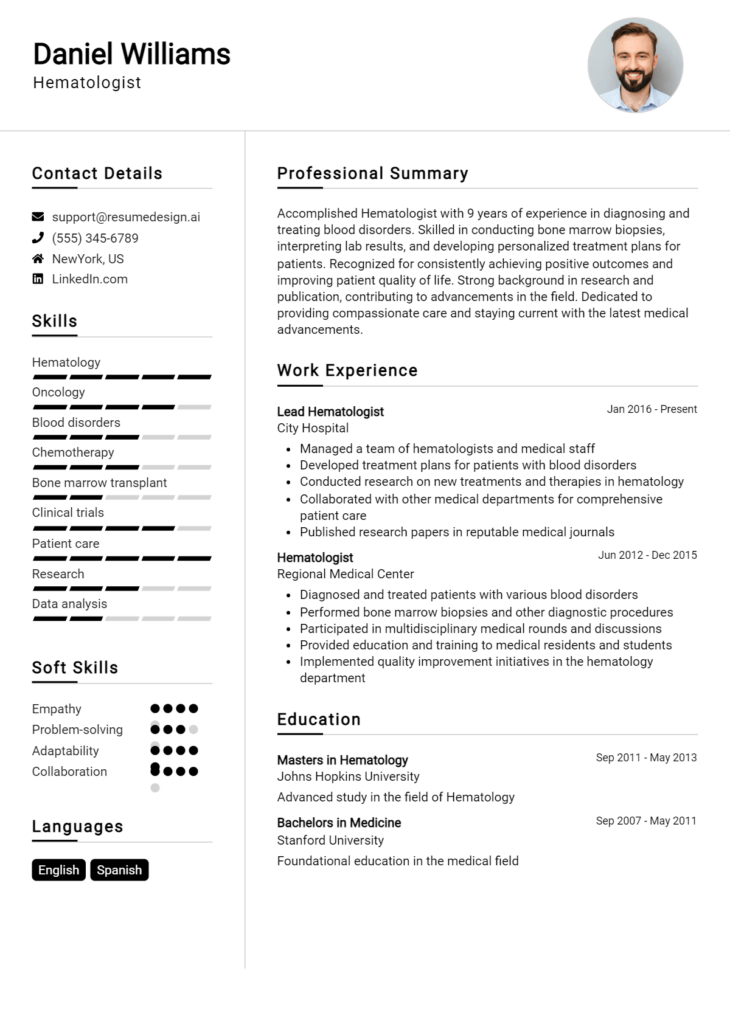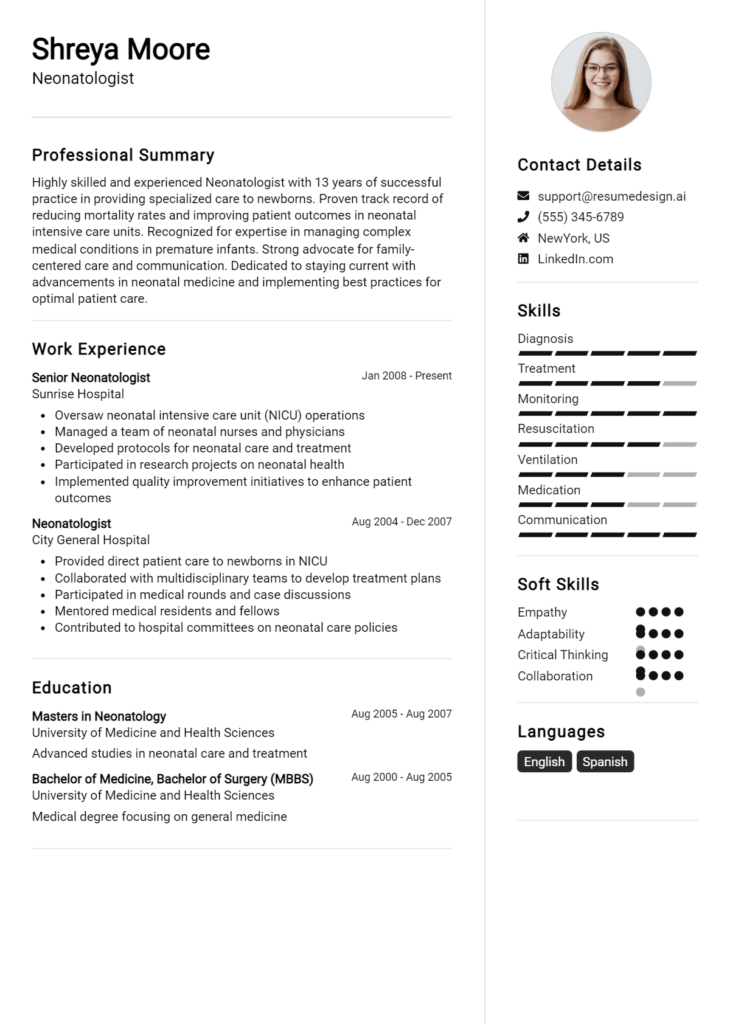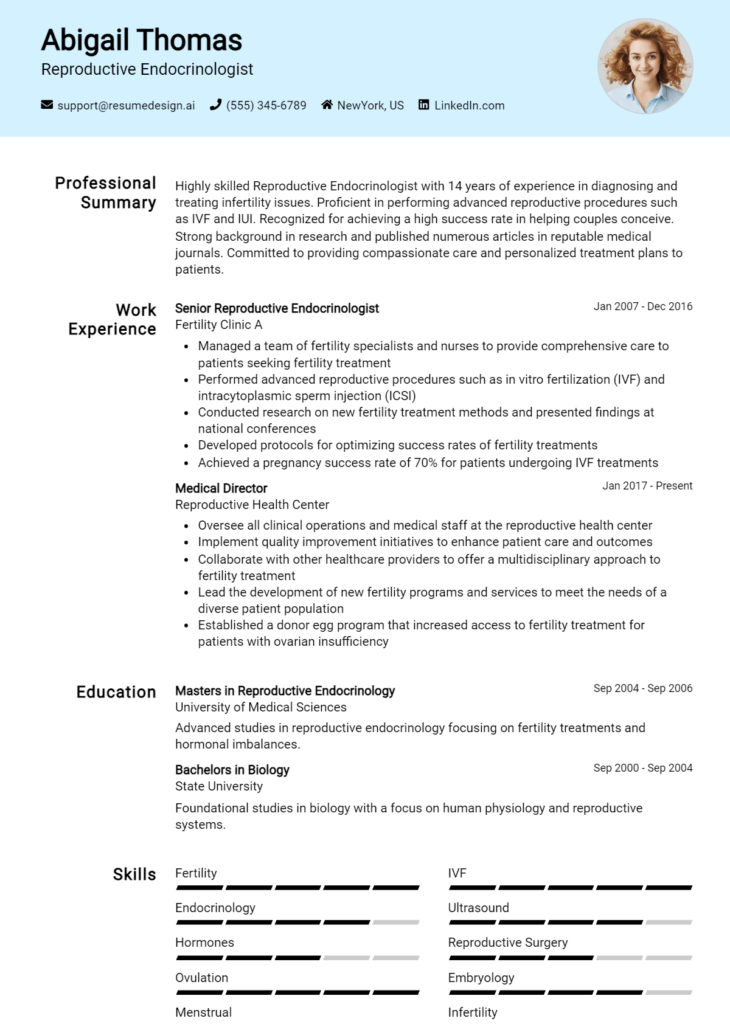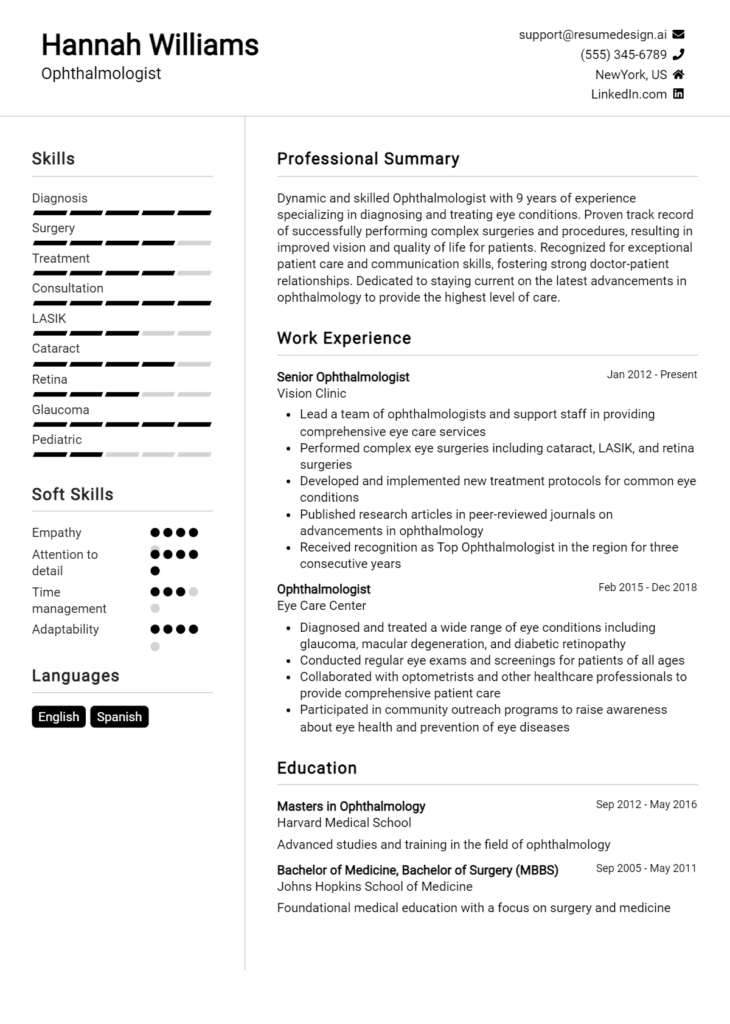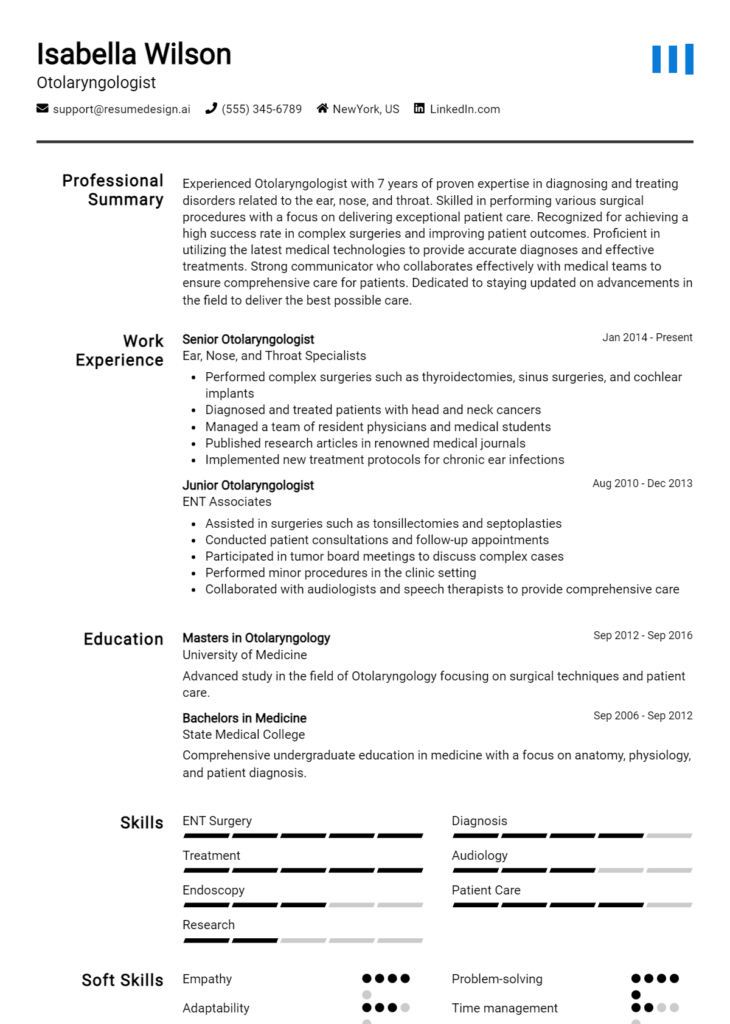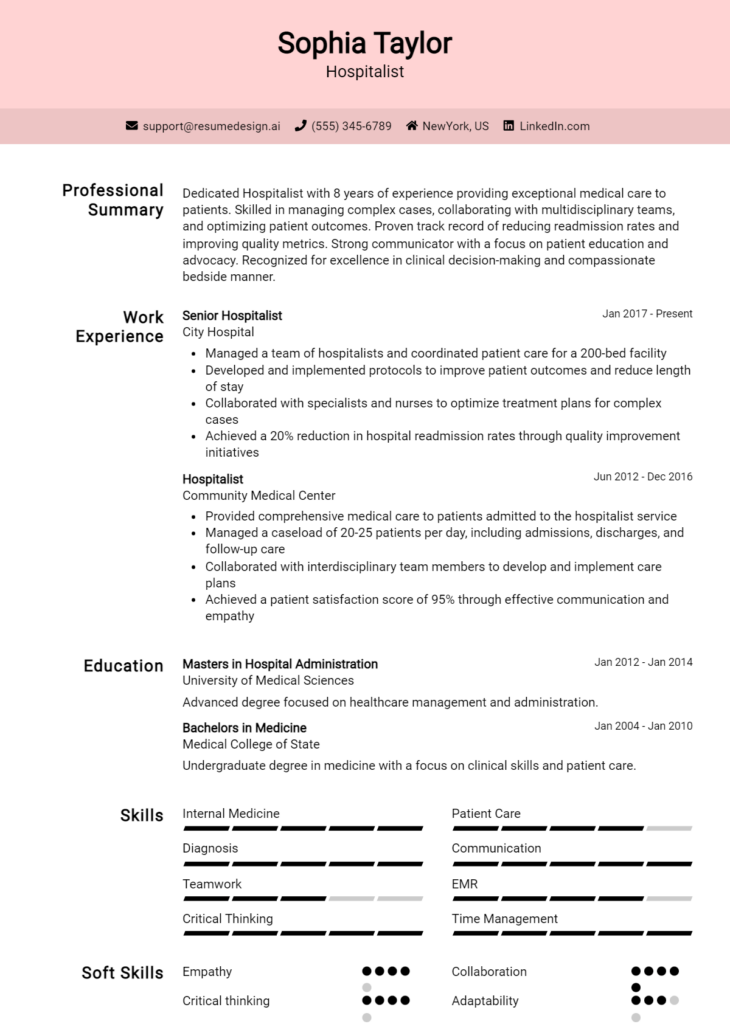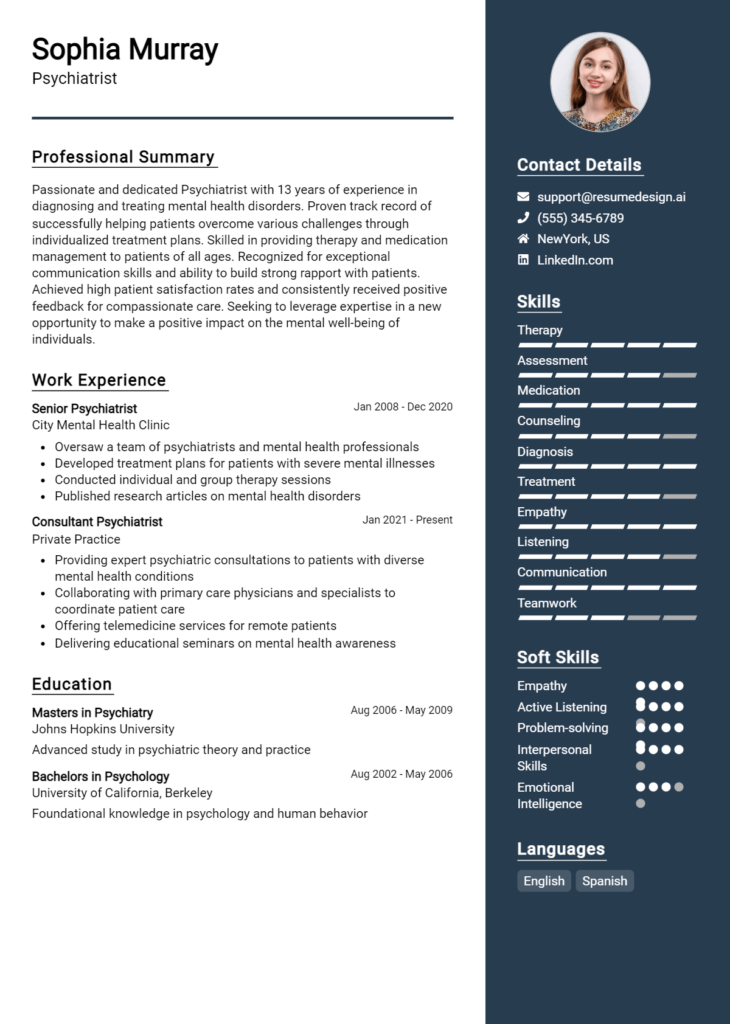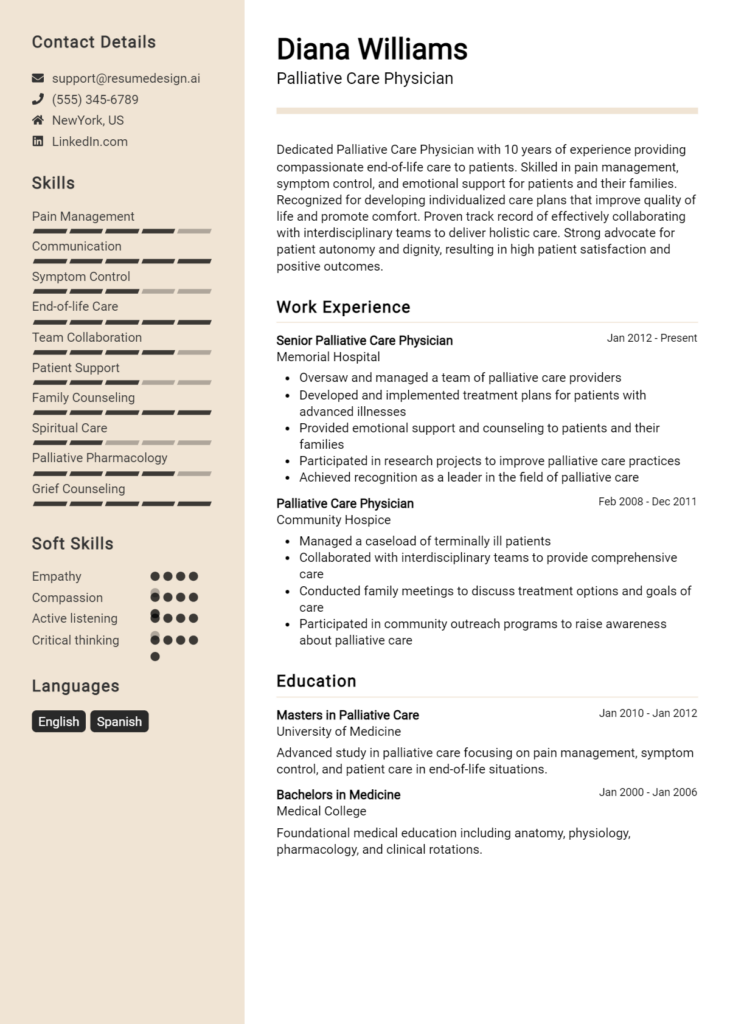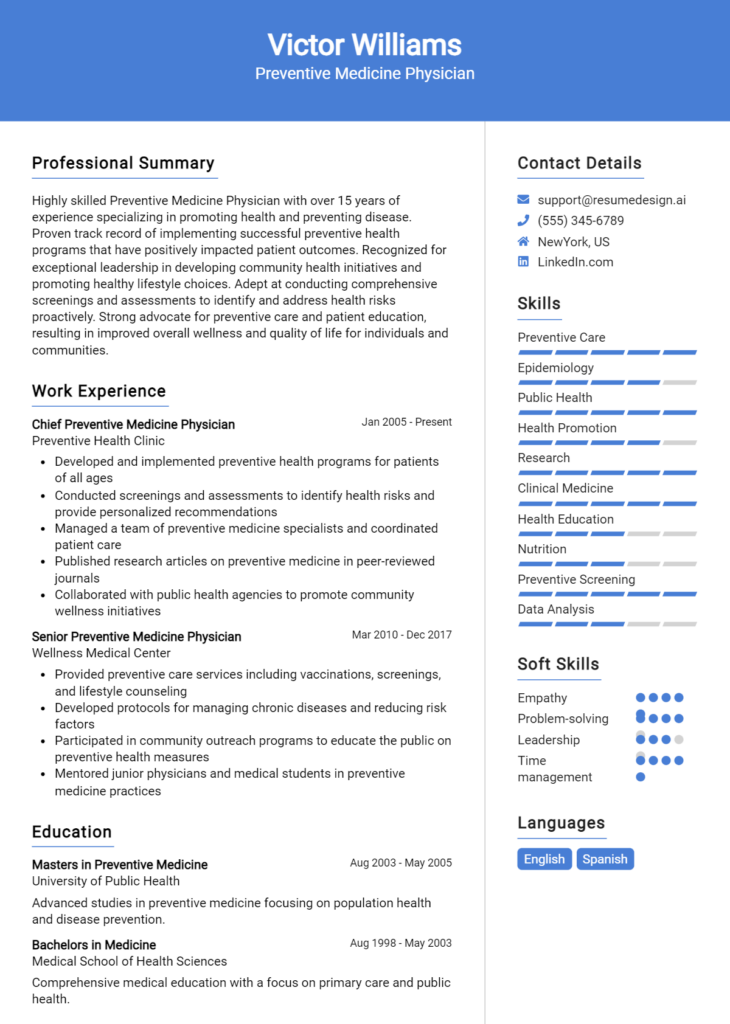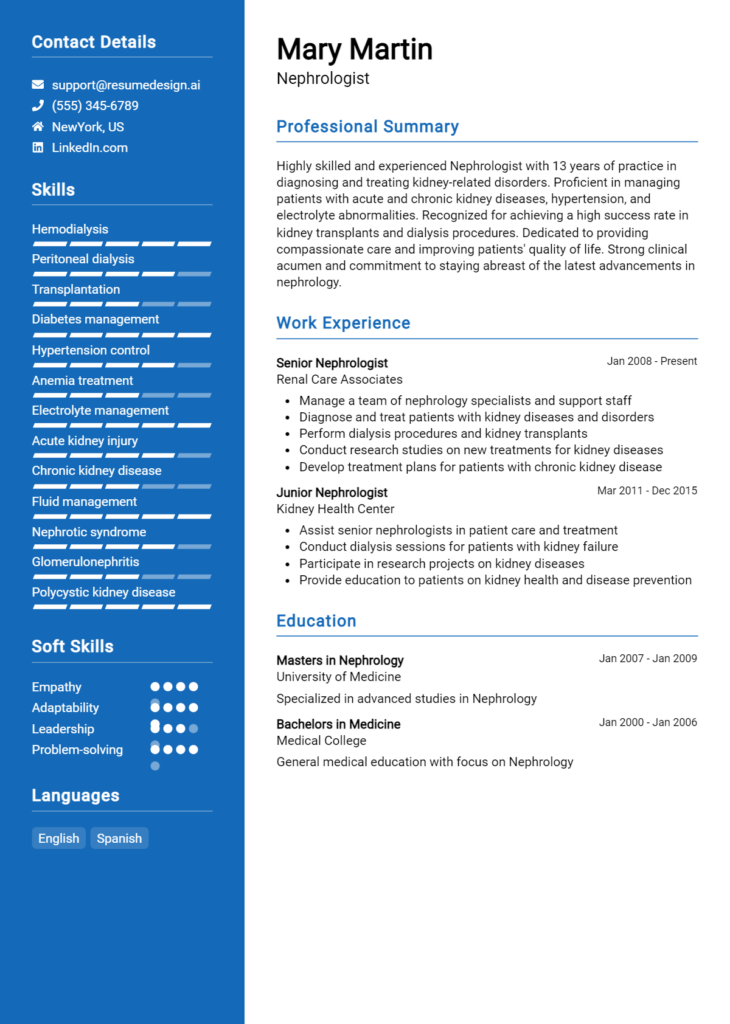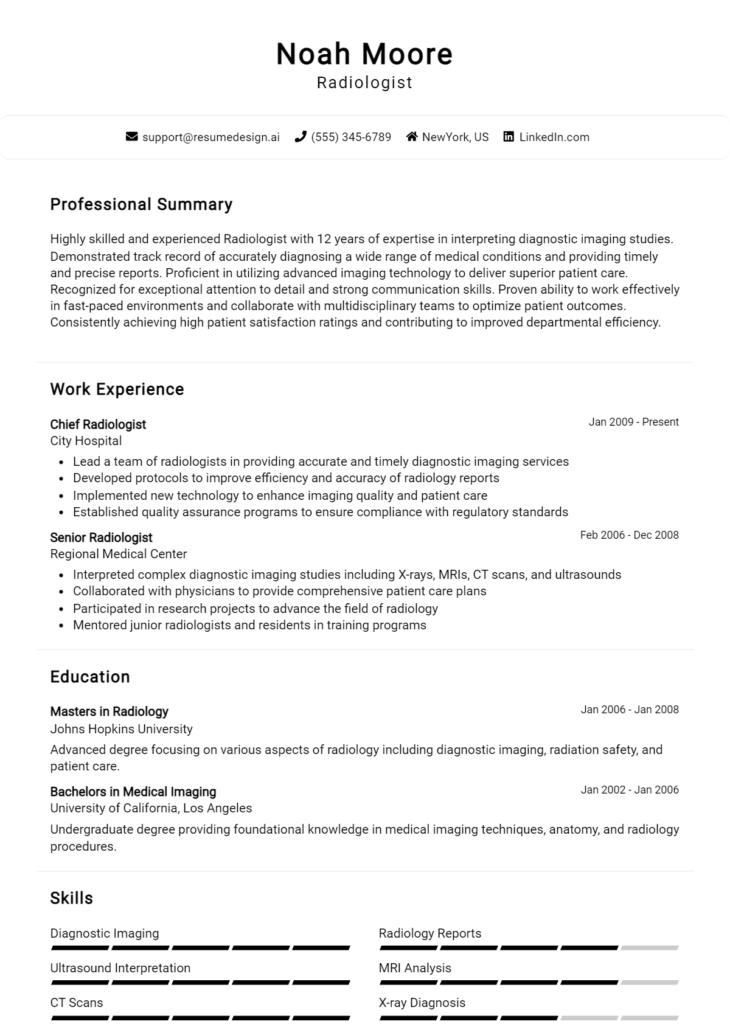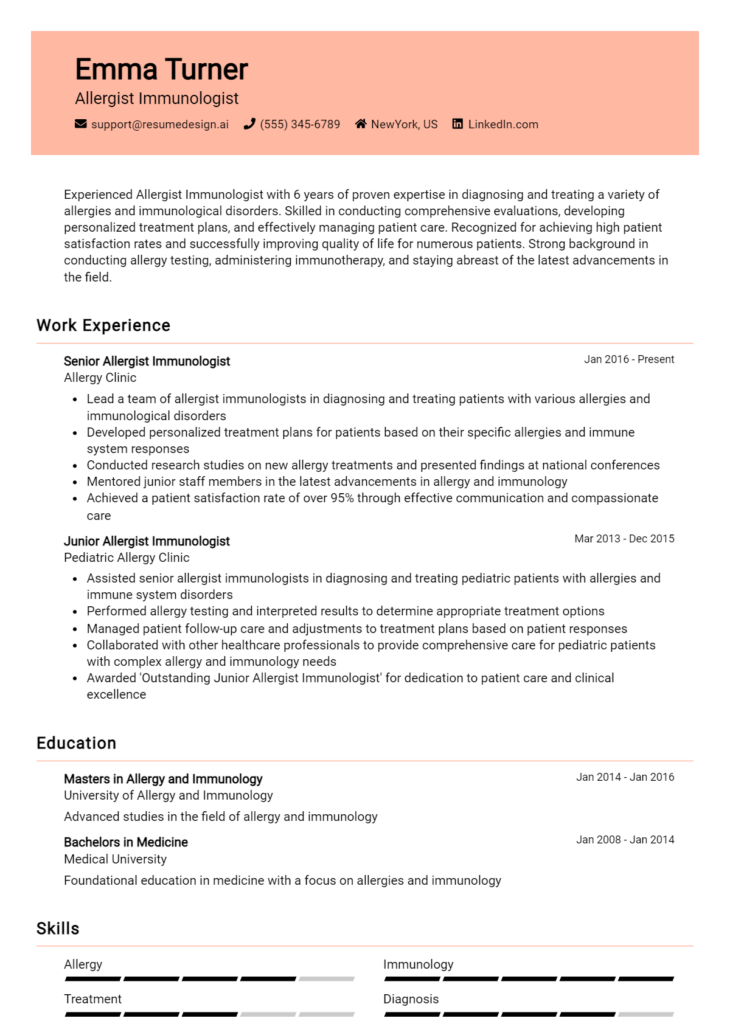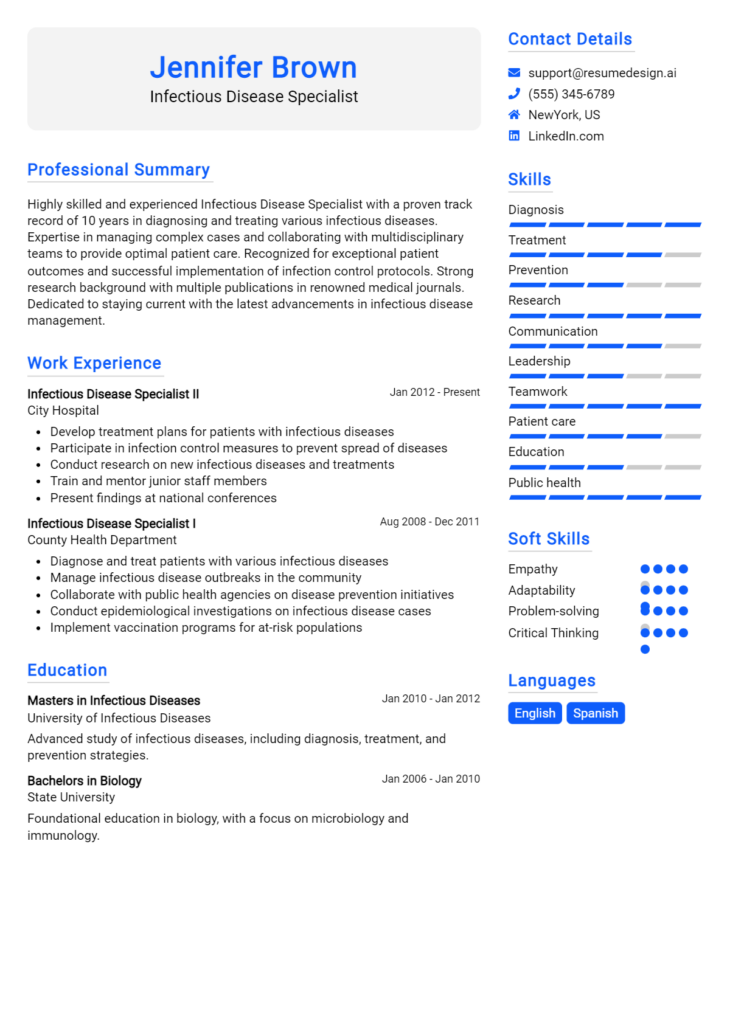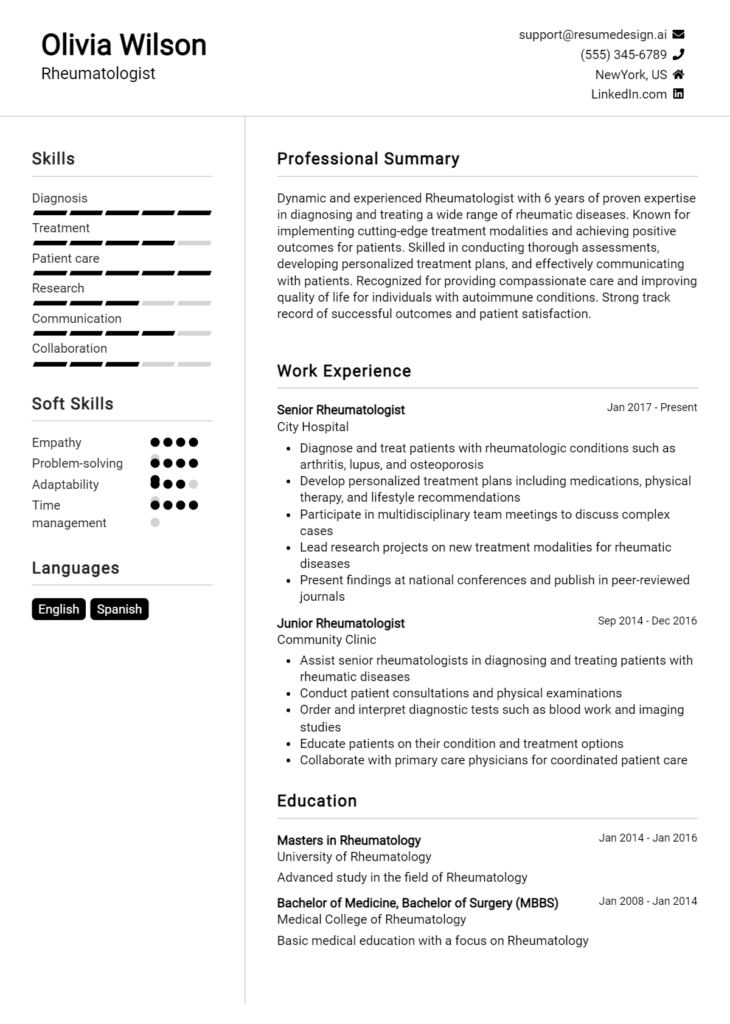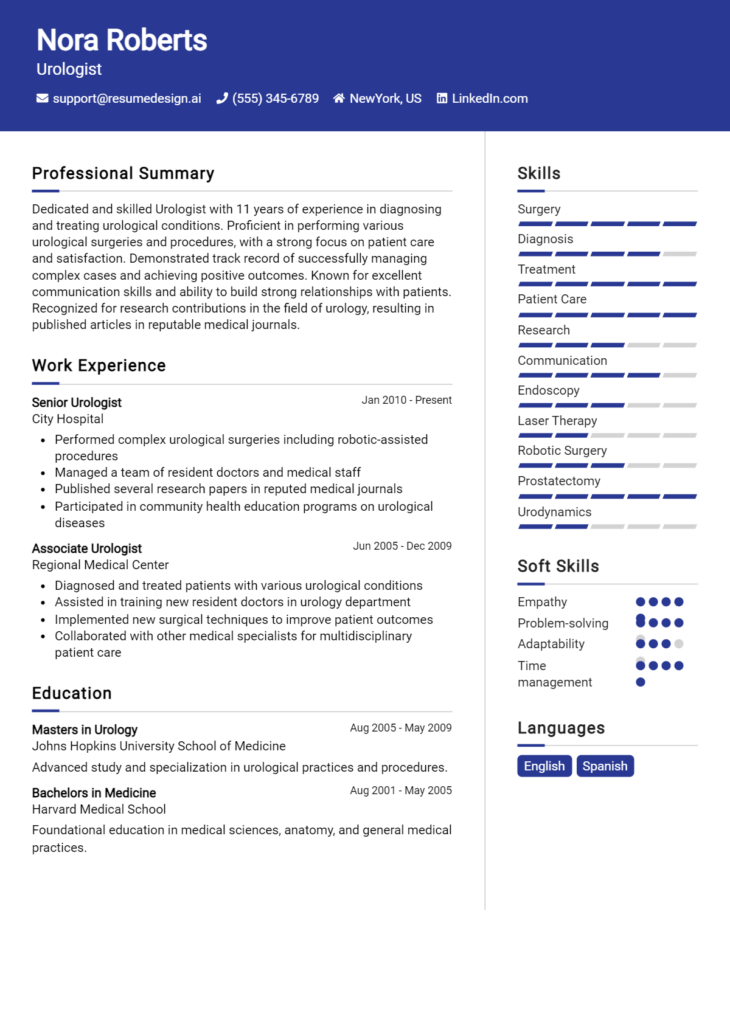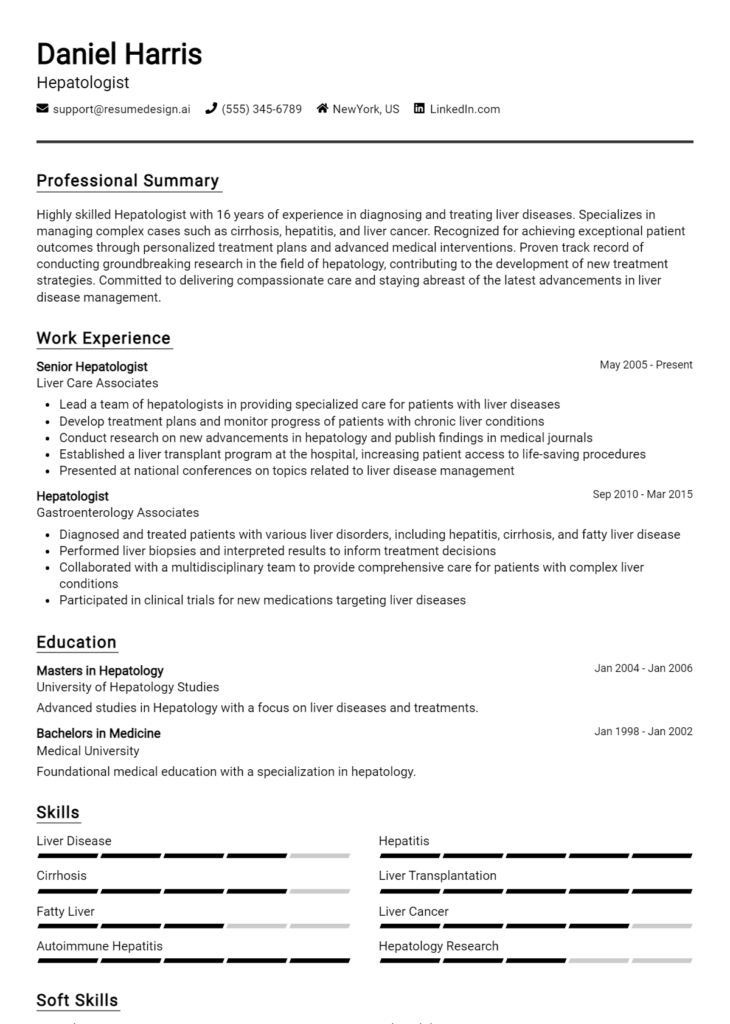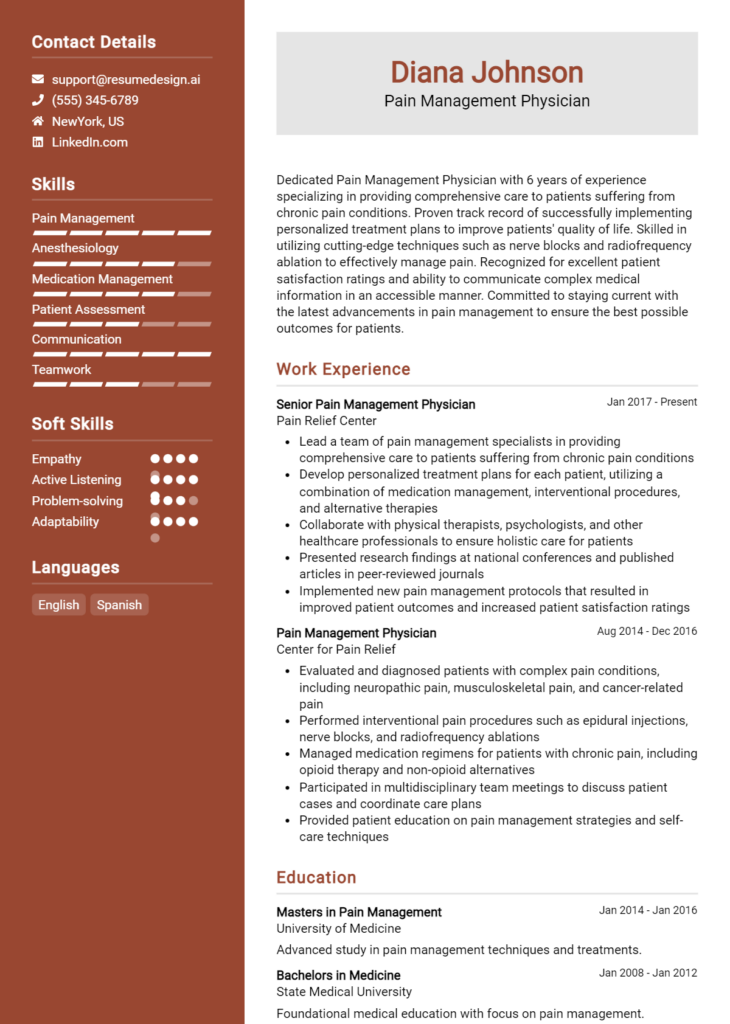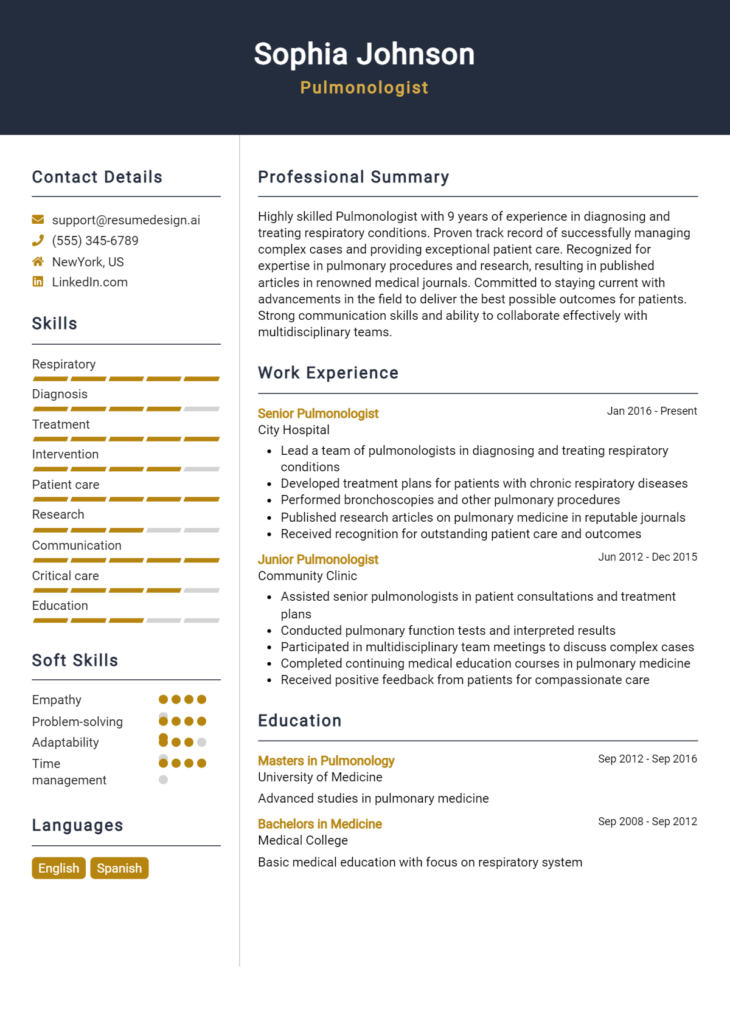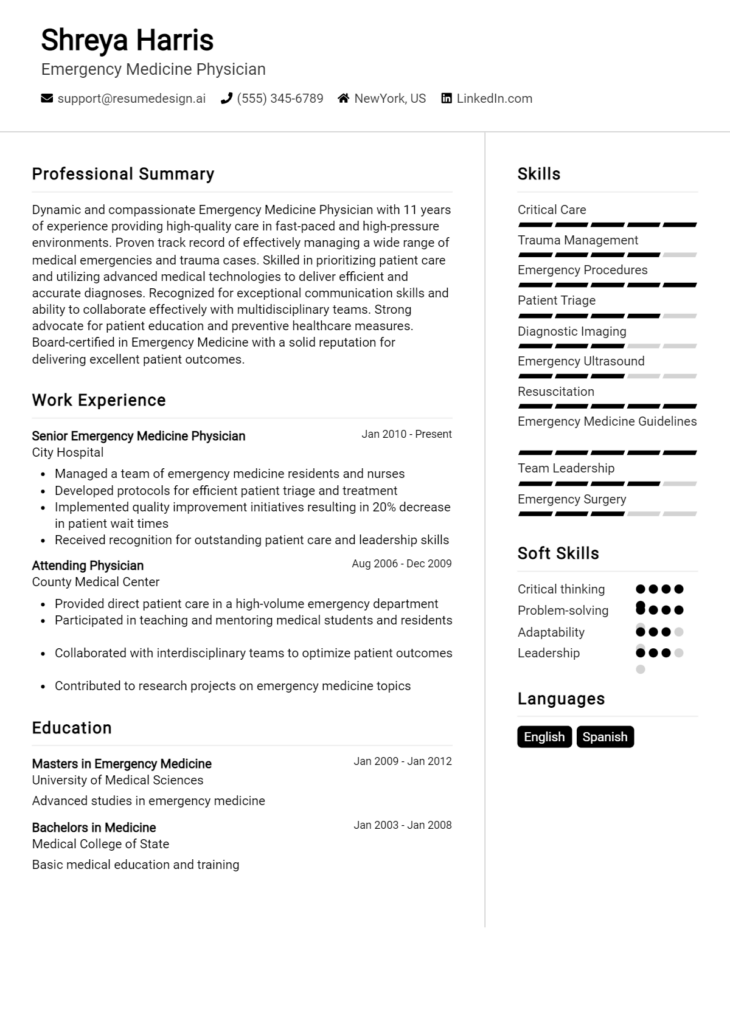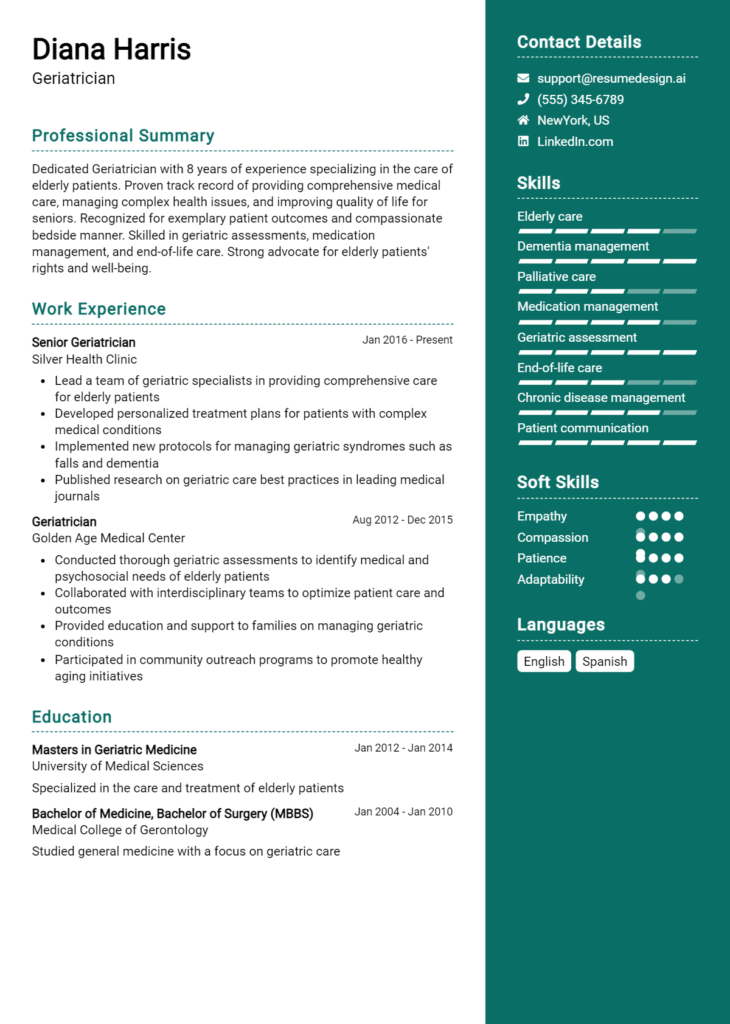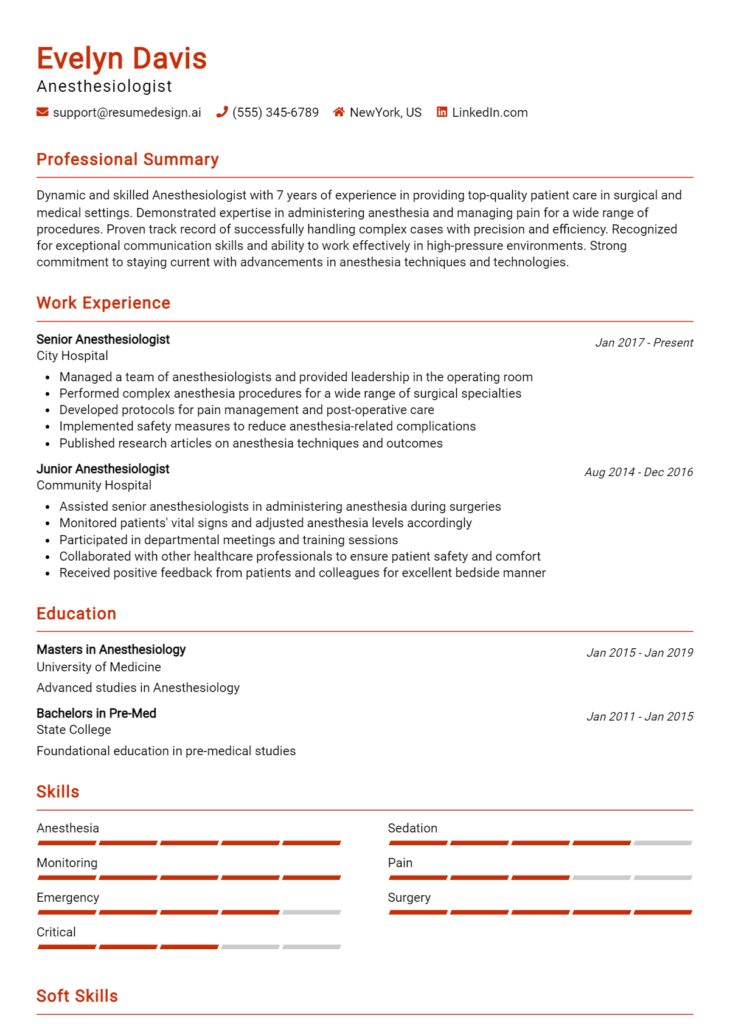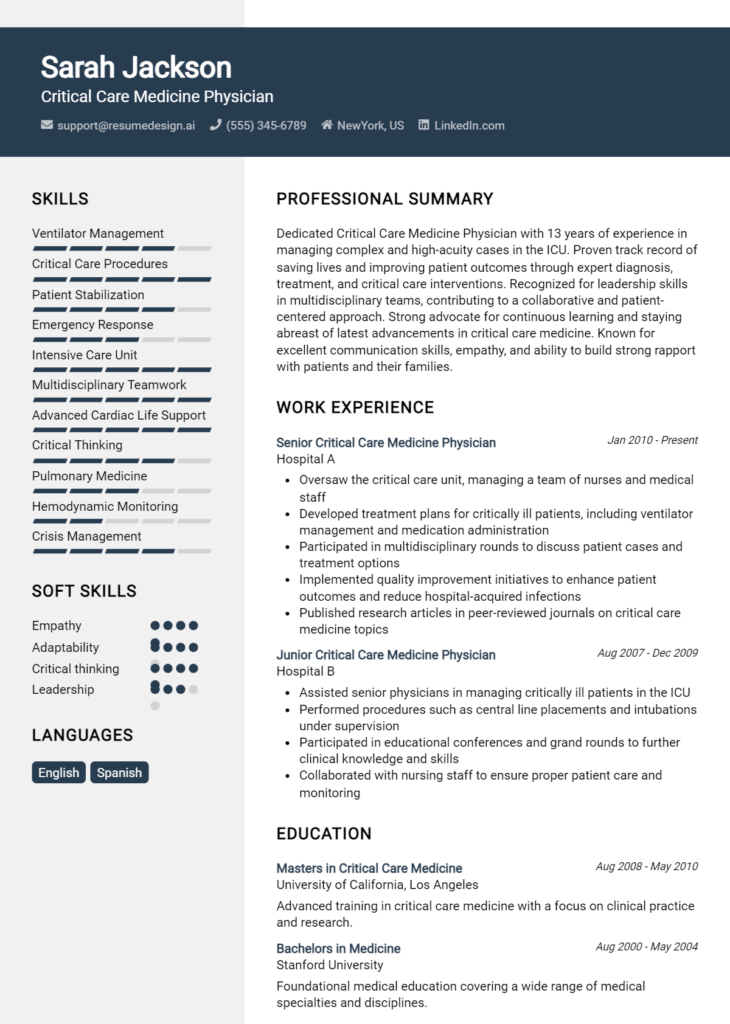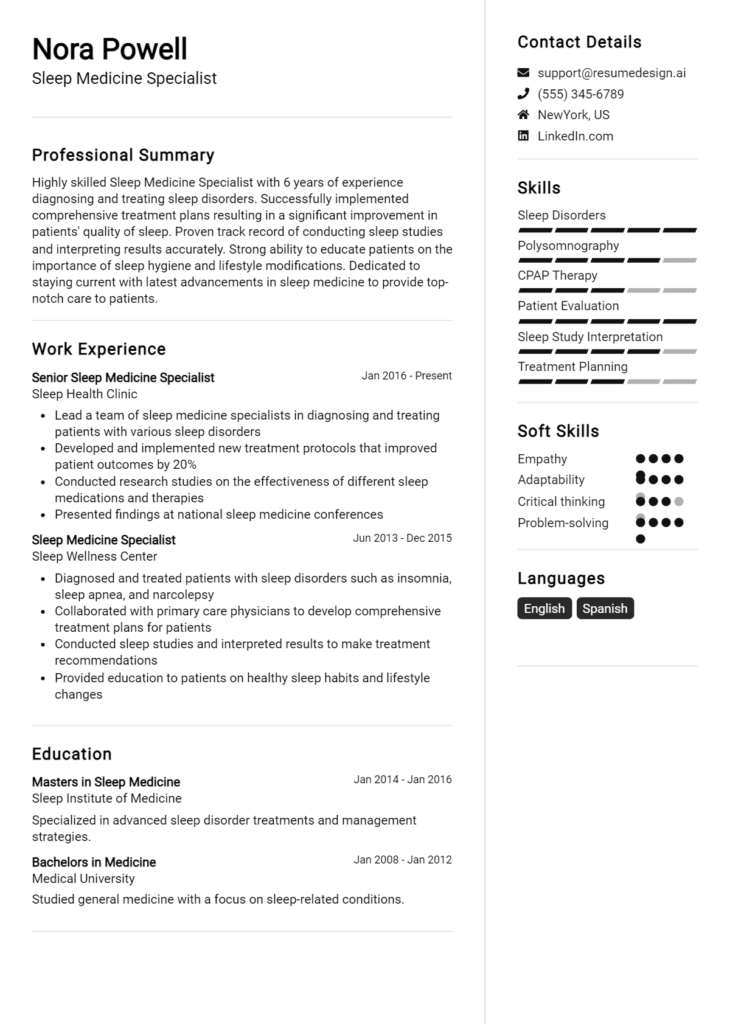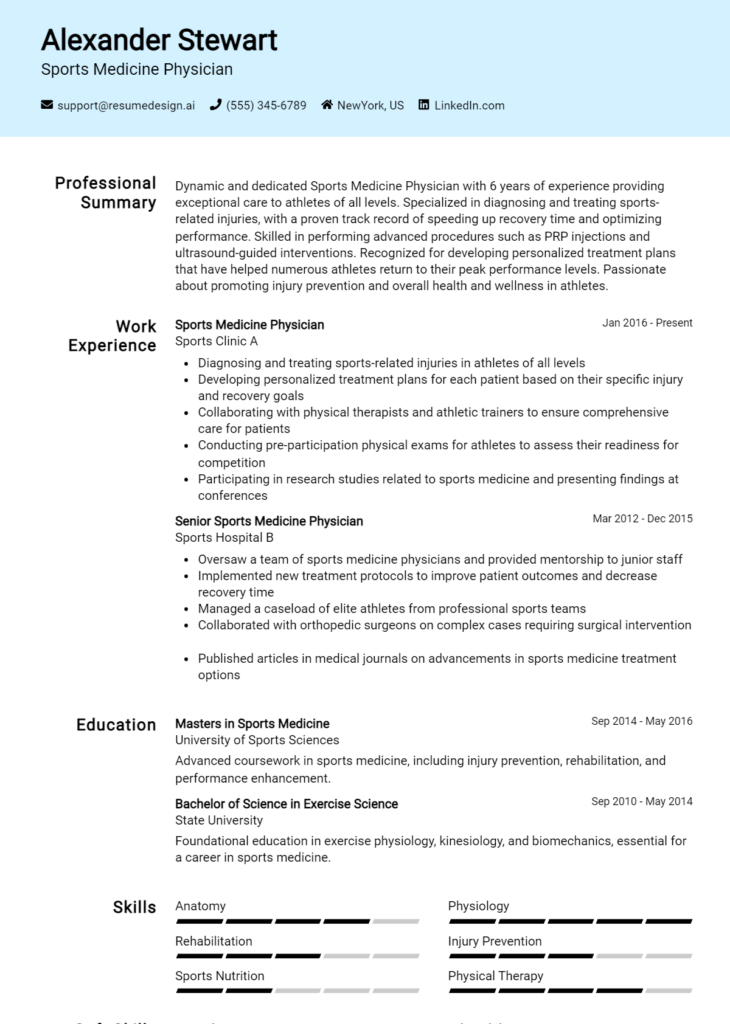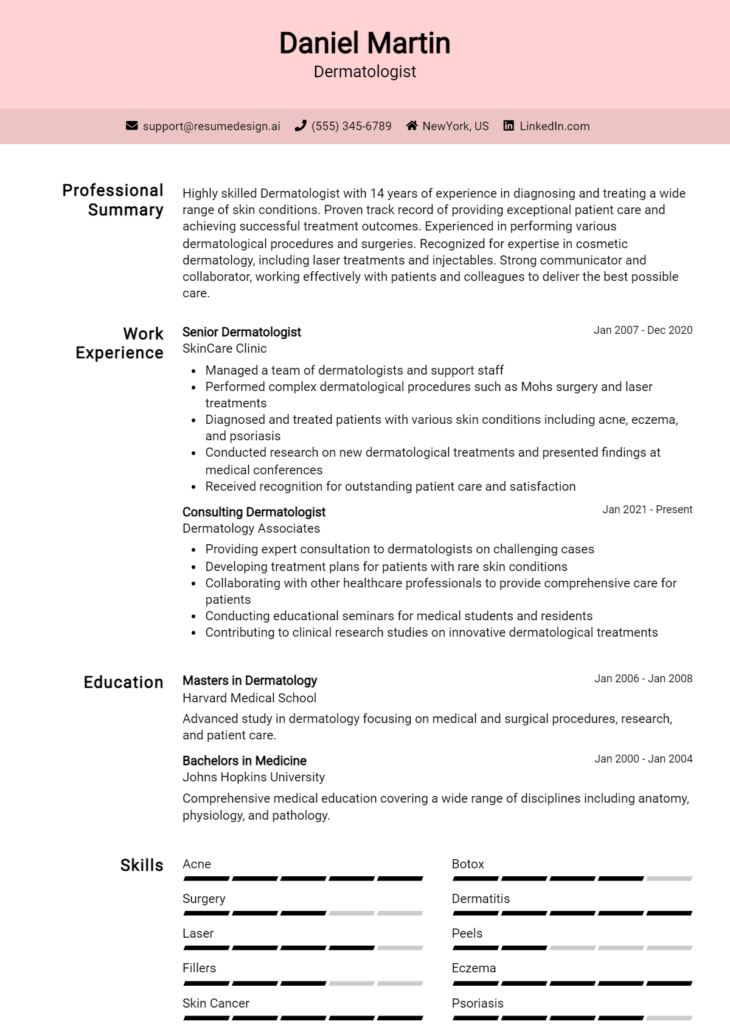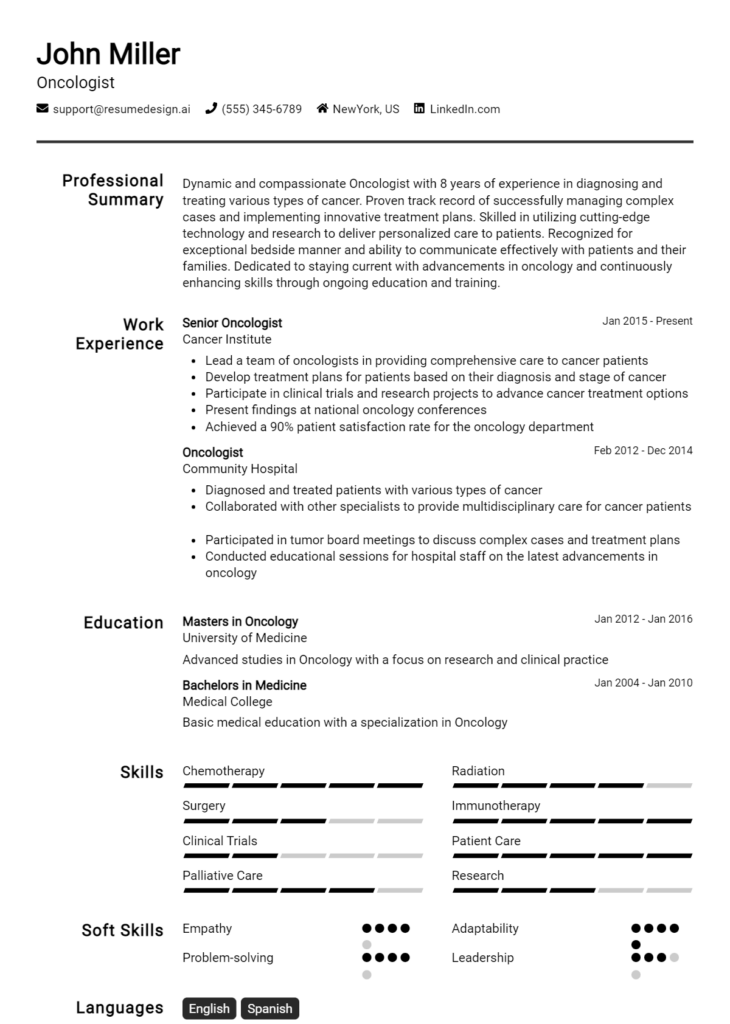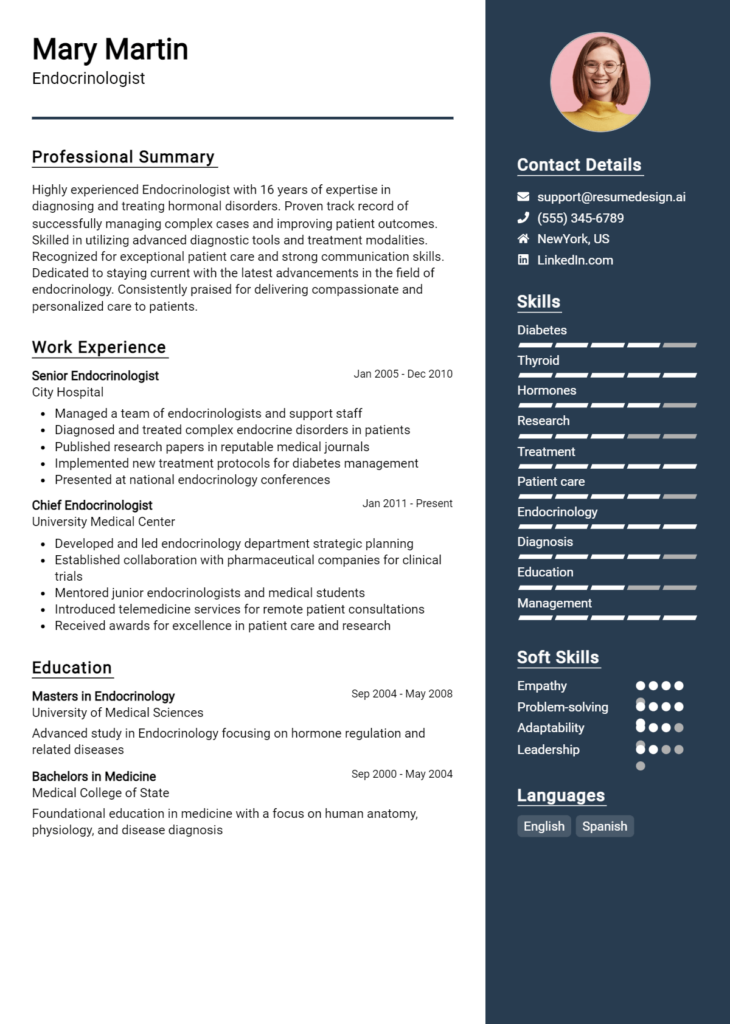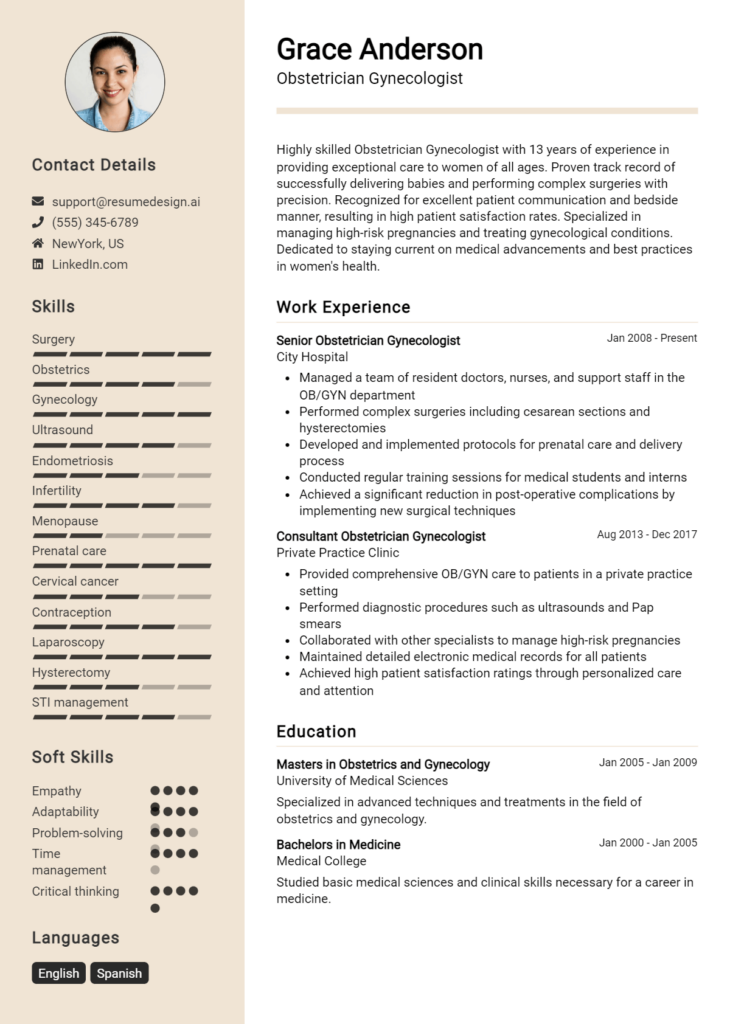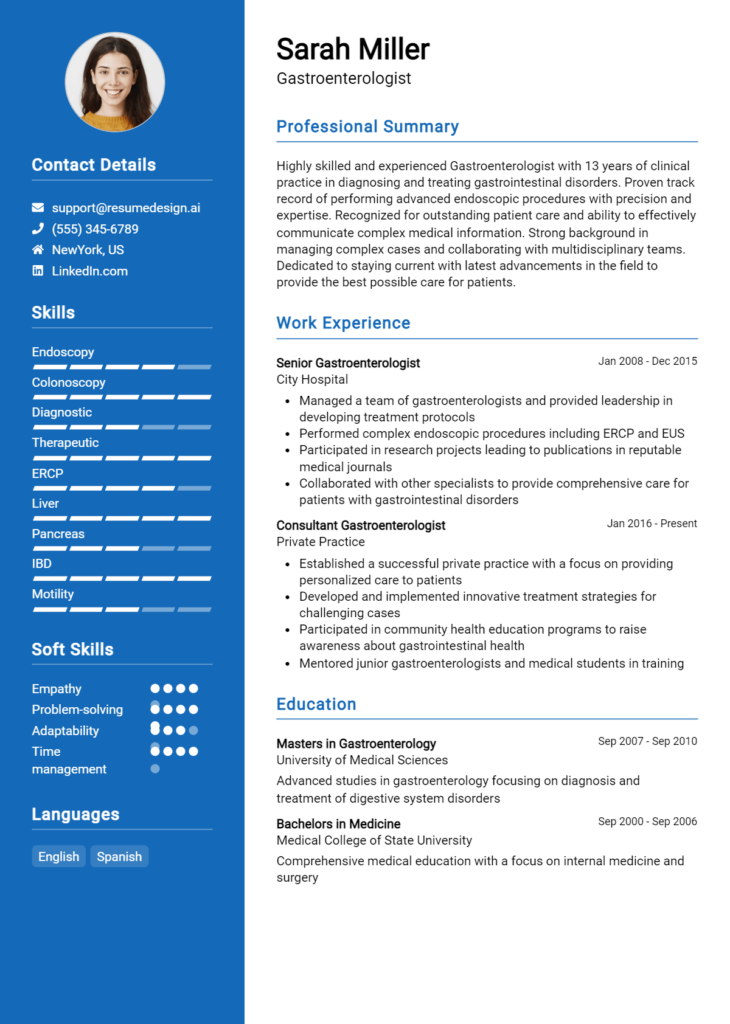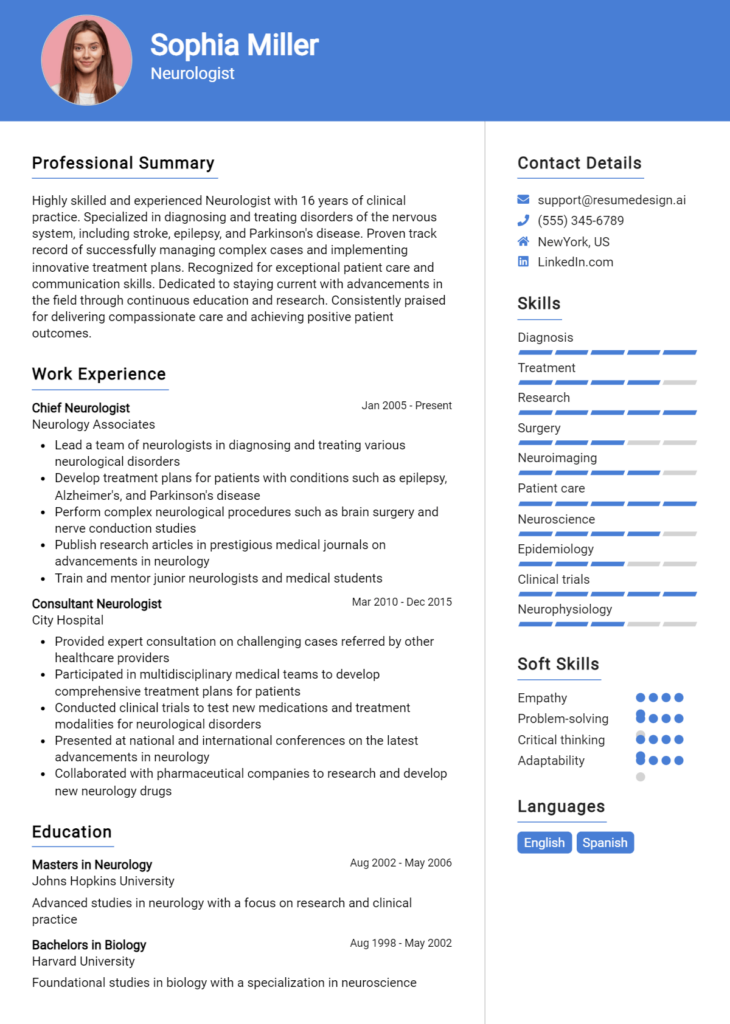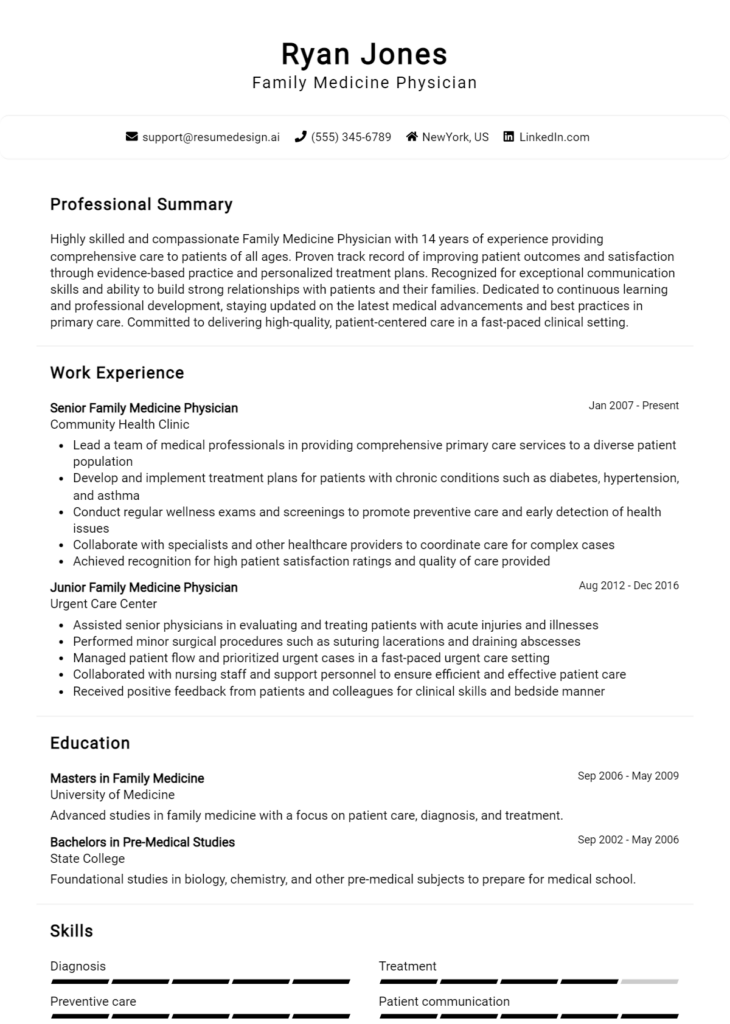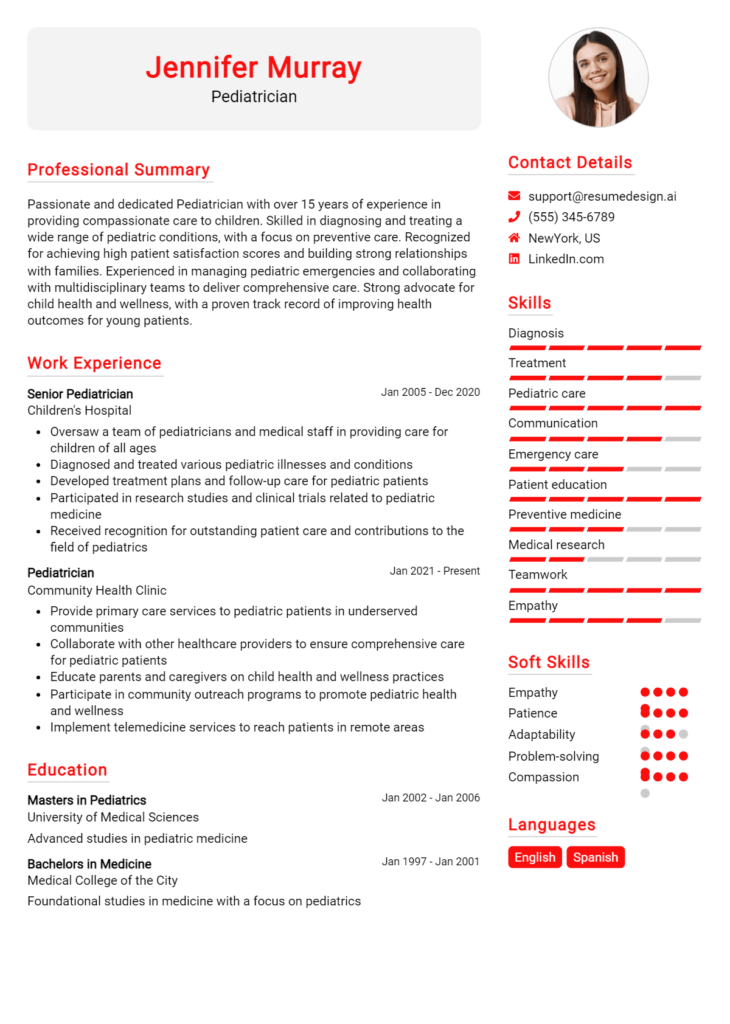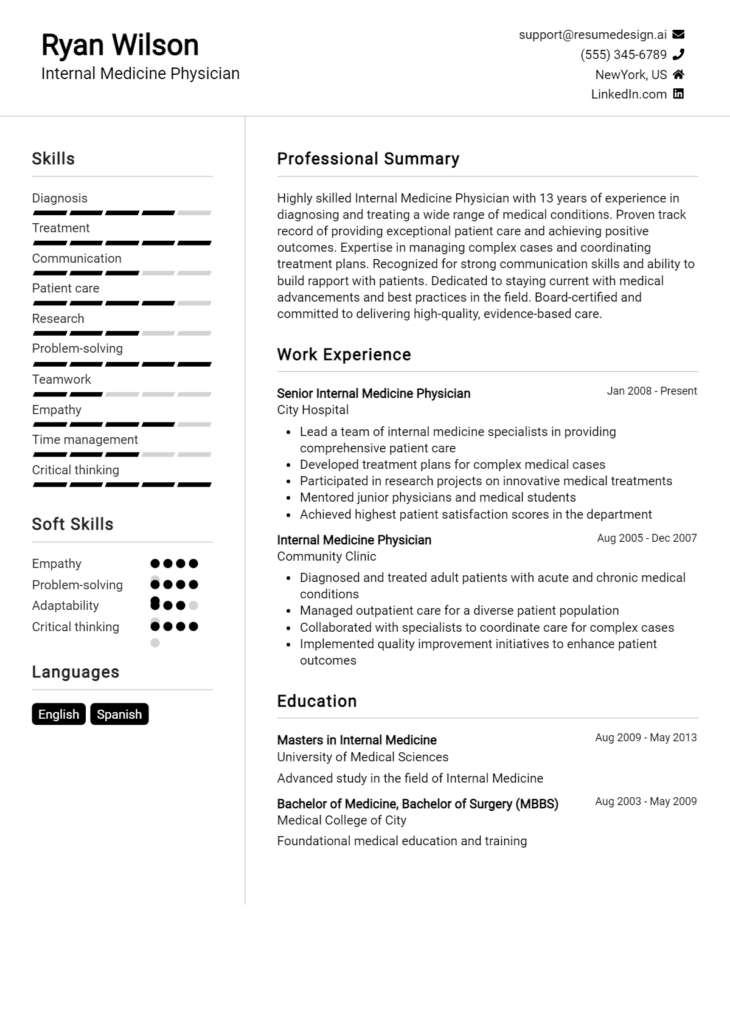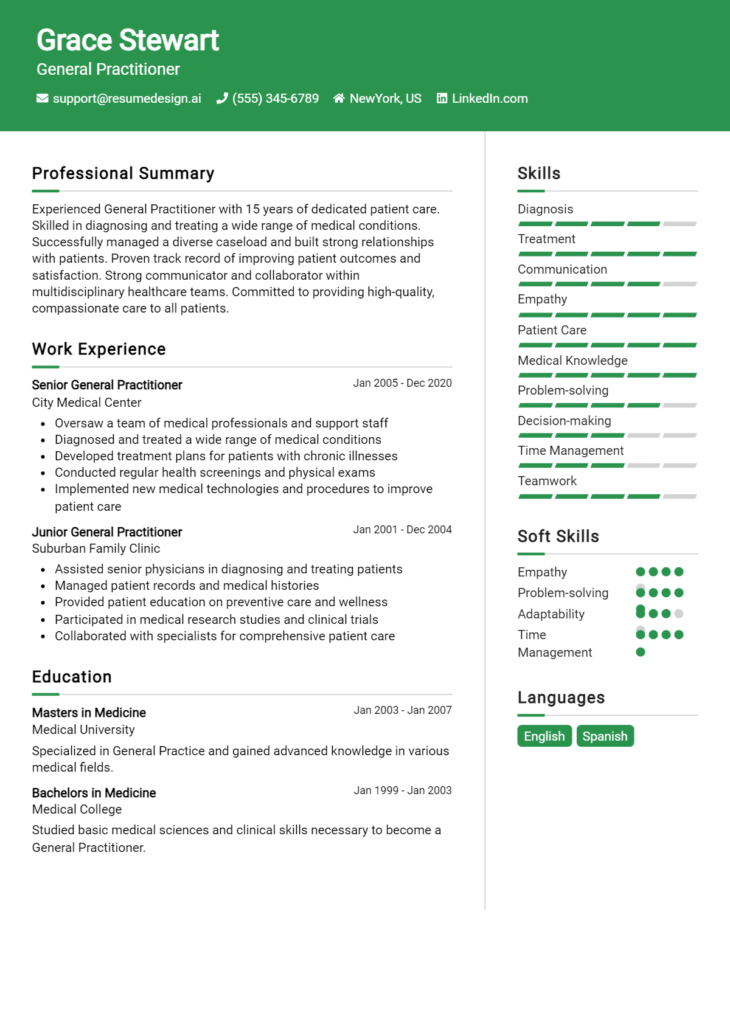Cardiologist Core Responsibilities
A Cardiologist is responsible for diagnosing and treating heart-related conditions, conducting tests, and developing treatment plans. This role requires strong technical abilities in cardiovascular procedures, operational skills for coordinating patient care, and problem-solving capabilities to address complex medical issues. Cardiologists often collaborate with various departments, including radiology and surgery, to ensure comprehensive care, significantly contributing to the organization’s overall health outcomes. A well-structured resume can effectively highlight these essential qualifications and experiences.
Common Responsibilities Listed on Cardiologist Resume
- Conducting comprehensive cardiovascular examinations and assessments
- Interpreting diagnostic tests such as echocardiograms and stress tests
- Developing and implementing individualized treatment plans
- Performing invasive procedures like catheterizations and angioplasties
- Managing chronic conditions such as hypertension and heart failure
- Collaborating with multidisciplinary teams for patient care
- Educating patients about heart health and preventive measures
- Staying updated on advancements in cardiology practices and technologies
- Maintaining detailed patient records and documentation
- Participating in clinical research and trials to advance cardiology
High-Level Resume Tips for Cardiologist Professionals
In the highly specialized field of cardiology, a well-crafted resume serves as a vital tool for professionals looking to make a lasting impression on potential employers. Given the competitive nature of the healthcare industry, your resume is often the first opportunity to showcase your skills, expertise, and accomplishments in patient care and medical knowledge. It is essential that it not only reflects your medical qualifications but also highlights your unique contributions and achievements in the field of cardiology. This guide will provide you with practical and actionable resume tips specifically tailored for cardiologist professionals, ensuring your application stands out in a crowded job market.
Top Resume Tips for Cardiologist Professionals
- Tailor your resume to the specific job description, emphasizing the skills and experiences most relevant to the position.
- Begin with a strong summary statement that encapsulates your professional background and career goals as a cardiologist.
- Showcase relevant clinical experience, including internships, fellowships, and any specialized training in cardiology.
- Quantify your achievements by using metrics (e.g., patient outcomes, procedures performed) to illustrate your impact in previous roles.
- Highlight industry-specific skills, such as proficiency in echocardiography, catheterization, and advanced imaging techniques.
- Include any certifications or professional memberships that demonstrate your commitment to continuous education in cardiology.
- Use action verbs to describe your responsibilities and contributions, making your achievements clear and compelling.
- Keep your resume format clean and professional, ensuring it is easy to read and free of clutter.
- Proofread for grammatical errors and typos, as attention to detail is crucial in the medical profession.
- Consider adding a section for published research or presentations, as these can highlight your expertise and dedication to the field.
By implementing these resume tips, cardiologist professionals can significantly enhance their chances of landing a desirable position in the field. A polished and targeted resume not only showcases your qualifications but also demonstrates your commitment to excellence in patient care, making you an attractive candidate to potential employers.
Why Resume Headlines & Titles are Important for Cardiologist
In the competitive field of cardiology, a well-crafted resume headline or title is crucial for distinguishing a candidate from the rest. This brief but impactful statement serves as the first impression on hiring managers, encapsulating the essence of a candidate's qualifications and expertise in just a few words. A strong headline can immediately grab attention, highlighting key skills or experiences relevant to the cardiology position being sought. It should be concise, relevant, and directly related to the job, making it easier for recruiters to identify the candidate's fit for the role at a glance.
Best Practices for Crafting Resume Headlines for Cardiologist
- Keep it concise: Aim for one to two impactful phrases.
- Be role-specific: Tailor your headline to the cardiology field.
- Highlight key qualifications: Include relevant skills or experiences.
- Use strong action verbs: Start with impactful verbs to convey your capabilities.
- Avoid jargon: Use clear language that is easily understood.
- Make it memorable: Craft a headline that stands out and resonates.
- Focus on results: If possible, indicate quantifiable achievements.
- Align with job description: Reflect keywords and phrases from the job posting.
Example Resume Headlines for Cardiologist
Strong Resume Headlines
"Board-Certified Cardiologist with 10+ Years of Experience in Interventional Procedures"
“Compassionate Cardiologist Specializing in Heart Failure Management and Patient-Centric Care”
“Experienced Cardiovascular Specialist Committed to Advancing Patient Outcomes through Innovative Treatments”
Weak Resume Headlines
“Cardiologist Seeking Job”
“Doctor with Experience”
The strong headlines are effective because they clearly communicate the candidate's specific expertise, years of experience, and focus areas in cardiology, making them memorable and relevant to hiring managers. On the other hand, the weak headlines fail to impress due to their vagueness and lack of detail, which do not convey the candidate's unique strengths or qualifications, ultimately blending into the sea of generic applications.
Writing an Exceptional Cardiologist Resume Summary
A well-crafted resume summary is essential for a Cardiologist as it serves as the first impression a hiring manager receives about a candidate's qualifications. In a competitive field where specialized expertise and clinical experience are paramount, a strong summary quickly captures attention by highlighting key skills, relevant experience, and notable accomplishments. It should be concise, impactful, and tailored to the specific job the candidate is applying for, effectively setting the tone for the rest of the resume and encouraging the reader to learn more about the candidate's qualifications.
Best Practices for Writing a Cardiologist Resume Summary
- Quantify achievements: Include specific numbers or statistics that demonstrate your impact and success in previous roles.
- Focus on skills: Highlight both technical and soft skills that are relevant to the cardiology field.
- Tailor the summary: Customize the summary for each job application to align with the job description and requirements.
- Use industry keywords: Incorporate relevant terminology that resonates with hiring managers and applicant tracking systems.
- Showcase clinical experience: Emphasize your hands-on experience in patient care and any specialized training.
- Highlight certifications: Mention any relevant board certifications or advanced training that enhance your qualifications.
- Keep it concise: Aim for 3-5 sentences that deliver maximum impact without overwhelming the reader.
- Reflect on personal philosophy: If appropriate, briefly include your approach to patient care and professional values.
Example Cardiologist Resume Summaries
Strong Resume Summaries
Board-certified cardiologist with over 10 years of experience in interventional cardiology. Successfully performed over 1,000 catheterizations, achieving a complication rate of less than 1%. Committed to providing high-quality patient care and educating patients on heart health through personalized treatment plans.
Dedicated cardiologist with extensive experience in echocardiography and stress testing. Improved patient outcomes by 30% through the implementation of a comprehensive heart failure management program in a multidisciplinary team environment.
Compassionate cardiologist recognized for excellence in patient communication and care. Led a team that reduced hospital readmission rates for heart failure patients by 25% over two years, enhancing overall patient satisfaction and quality of care.
Weak Resume Summaries
Experienced doctor who works with heart patients and has some certifications.
Cardiologist with a variety of skills and a general interest in improving patient care.
The strong resume summaries effectively demonstrate quantifiable results and specific skills that directly relate to the cardiologist role, showcasing the candidate's achievements and contributions to patient care. In contrast, the weak summaries are vague and lack concrete outcomes, making it difficult for hiring managers to gauge the candidates' true value and expertise in the field of cardiology.
Work Experience Section for Cardiologist Resume
The work experience section of a Cardiologist's resume is critical as it serves as a platform to demonstrate the candidate's technical skills, leadership abilities, and commitment to delivering high-quality healthcare solutions. This section not only highlights the clinical expertise and procedural knowledge that are essential for a successful cardiologist but also showcases their ability to manage teams, coordinate with multidisciplinary staff, and contribute to innovative healthcare practices. Quantifying achievements—such as patient outcomes, procedural success rates, or contributions to research—alongside aligning experiences with industry standards is vital to making a compelling case for the candidate's capabilities and value to potential employers.
Best Practices for Cardiologist Work Experience
- Highlight specific technical skills related to cardiology, such as echocardiography, stress testing, and catheterization.
- Quantify achievements with metrics, such as percentages of successful procedures or improvements in patient recovery times.
- Emphasize collaborative experiences with other healthcare professionals, illustrating teamwork in patient care.
- Use action verbs to begin bullet points to convey a sense of proactivity and involvement.
- Include relevant certifications or training that enhance your technical expertise.
- Tailor experiences to reflect alignment with the job description and industry standards.
- Document leadership roles in projects or initiatives that improved patient care or operational efficiency.
- Showcase involvement in research or publications that contribute to the field of cardiology.
Example Work Experiences for Cardiologist
Strong Experiences
- Led a team of cardiology fellows in a groundbreaking study on heart failure management, resulting in a 25% increase in patient recovery rates.
- Implemented a new echocardiography protocol that improved diagnostic accuracy by 30%, significantly reducing the need for invasive procedures.
- Collaborated with a multidisciplinary team to develop a comprehensive cardiac rehabilitation program, enhancing patient adherence rates by 40%.
- Authored three peer-reviewed articles on advancements in interventional cardiology, contributing to the ongoing dialogue in the field.
Weak Experiences
- Worked at a hospital and treated patients.
- Participated in various meetings with other doctors.
- Helped with patient care in the cardiology department.
- Attended conferences related to cardiology.
The examples provided illustrate the distinction between strong and weak experiences. Strong experiences are characterized by specific, quantifiable achievements that demonstrate a clear impact on patient outcomes and operational improvements. They showcase leadership, collaboration, and contributions to the field, making them compelling. In contrast, weak experiences lack detail and specificity, failing to convey the candidate's true capabilities and impact in the cardiology field. This stark contrast emphasizes the importance of clarity and quantification in presenting work history effectively.
Education and Certifications Section for Cardiologist Resume
The education and certifications section of a Cardiologist's resume is vital in showcasing the candidate's academic credentials, specialized training, and ongoing commitment to professional development. This section not only highlights the educational background essential for a cardiology career but also emphasizes industry-relevant certifications that validate the candidate's expertise. By providing specific coursework, certifications, and advanced training, the candidate can significantly enhance their credibility and demonstrate their alignment with the demands of the job role, signaling to potential employers that they are well-equipped to excel in the field.
Best Practices for Cardiologist Education and Certifications
- List your highest degree first, followed by relevant certifications.
- Include specific coursework that relates directly to cardiology, such as cardiac physiology or interventional procedures.
- Highlight advanced certifications, such as Board Certification in Cardiology or Fellow of the American College of Cardiology (FACC).
- Keep descriptions concise but informative, focusing on the most relevant qualifications.
- Include dates of graduation and certification to demonstrate currency in the field.
- Consider including continuing medical education (CME) courses that reflect ongoing learning.
- Use industry-standard terminology and abbreviations to enhance professionalism.
- Tailor this section to the specific job description, emphasizing the most relevant qualifications.
Example Education and Certifications for Cardiologist
Strong Examples
- Doctor of Medicine (MD), Harvard Medical School, 2015
- Board Certified in Cardiology, American Board of Internal Medicine, 2018
- Fellow of the American College of Cardiology (FACC), 2020
- Advanced Cardiac Life Support (ACLS) Certification, 2023
Weak Examples
- Bachelor of Arts in History, University of California, Los Angeles, 2010
- Certification in Basic Life Support (BLS) from 2015 (outdated)
- Online Course in Nutrition (not cardiology-specific), 2021
- Diploma in Medical Billing and Coding, 2019
The examples provided illustrate the difference between strong and weak qualifications. Strong examples demonstrate relevant degrees and certifications that are directly applicable to cardiology, enhancing the candidate's credibility. In contrast, weak examples feature unrelated educational backgrounds or outdated certifications that do not support the specific role of a cardiologist, which could undermine the candidate's qualifications in the eyes of potential employers.
Top Skills & Keywords for Cardiologist Resume
As a Cardiologist, the combination of medical expertise and interpersonal skills is crucial for delivering exceptional patient care. A well-crafted resume that highlights these skills can significantly enhance your chances of standing out in a competitive job market. The skills section of your resume serves as a snapshot of your qualifications and abilities, showcasing both your technical proficiency and your capacity for effective patient interaction. By emphasizing the right mix of hard and soft skills, you can convey your readiness to tackle the challenges of this demanding field and your commitment to improving patient outcomes.
Top Hard & Soft Skills for Cardiologist
Soft Skills
- Empathy
- Communication Skills
- Critical Thinking
- Teamwork and Collaboration
- Attention to Detail
- Problem-Solving
- Time Management
- Adaptability
- Patient Advocacy
- Leadership
Hard Skills
- Proficiency in Cardiac Imaging Techniques (e.g., echocardiography, MRI)
- Knowledge of ECG Interpretation
- Understanding of Pharmacology Related to Cardiology
- Competence in Cardiac Catheterization
- Familiarity with Electrophysiology Procedures
- Expertise in Heart Failure Management
- Skills in Preventive Cardiology
- Ability to Perform Stress Testing
- Proficient in Clinical Research Methodologies
- Knowledge of Cardiovascular Disease Management Guidelines
For more information on how to effectively showcase your skills and work experience, consider tailoring these sections to reflect your unique qualifications and contributions to the field of cardiology.
Stand Out with a Winning Cardiologist Cover Letter
Dear [Hiring Manager's Name],
I am writing to express my interest in the Cardiologist position at [Hospital/Clinic Name] as advertised on [where you found the job listing]. With a robust background in cardiology, including over [X years] of clinical experience, and a deep commitment to advancing cardiac care, I am excited about the opportunity to contribute to your esteemed team. My training at [Your Medical School/Residency Program] equipped me with the skills to diagnose and treat a wide range of cardiovascular conditions, and I am passionate about providing patient-centered care that empowers individuals to take charge of their heart health.
Throughout my career, I have honed my skills in performing diagnostic tests, interpreting echocardiograms, and managing complex cardiac cases. At [Previous Employer/Institution], I successfully implemented a patient education program that improved adherence to treatment plans among my patients, resulting in enhanced outcomes and satisfaction. I believe that my focus on collaborative approaches in patient management can contribute positively to the high standards of care at [Hospital/Clinic Name]. Additionally, my ongoing involvement in research projects has kept me at the forefront of advancements in cardiology, ensuring that I am always equipped with the latest techniques and knowledge to benefit my patients.
I am particularly drawn to [Hospital/Clinic Name] because of its commitment to innovation and excellence in cardiovascular care. I admire your recent initiatives in [mention any specific programs, technologies, or research relevant to the institution], and I am eager to bring my expertise in both clinical practice and patient education to your team. I am confident that my proactive approach and dedication to continuous improvement align with your institution's mission to provide exceptional care and support to patients facing cardiovascular challenges.
Thank you for considering my application. I look forward to the possibility of discussing how my skills and experiences align with the needs of your team. I am excited about the opportunity to contribute to [Hospital/Clinic Name] and to help enhance the quality of care provided to your patients.
Sincerely,
[Your Name]
[Your Contact Information]
[Your LinkedIn Profile or Professional Website, if applicable]
Common Mistakes to Avoid in a Cardiologist Resume
Creating a compelling resume as a cardiologist is crucial for standing out in a competitive job market. However, many candidates make common mistakes that can undermine their chances of securing an interview. By avoiding these pitfalls, you can present a polished and professional image that highlights your qualifications and expertise in the field of cardiology. Here are some common mistakes to avoid in a cardiologist resume:
Overloading with Medical Jargon: While technical terms are important, excessive jargon can make your resume difficult to read for non-medical hiring managers. Aim for clarity and conciseness.
Neglecting a Summary Section: Failing to include a strong summary or objective statement can leave your resume lacking focus. This section should highlight your key qualifications and career goals.
Ignoring Relevant Experience: Omitting pertinent clinical experiences or research relevant to cardiology can weaken your application. Be sure to showcase all experiences that demonstrate your expertise in this specialty.
Listing Responsibilities Instead of Achievements: Simply stating duties performed in previous roles does not effectively communicate your impact. Focus on quantifiable achievements that illustrate your contributions and successes.
Using a Generic Template: Relying on a one-size-fits-all resume template can make your application blend in with the crowd. Personalize your resume to reflect your unique qualifications and style.
Failing to Tailor Your Resume: Not customizing your resume for each specific job application can diminish its effectiveness. Take the time to align your skills and experiences with the job description.
Inconsistent Formatting: A resume with inconsistent fonts, sizes, or spacing can appear unprofessional. Ensure that your formatting is uniform and easy to follow.
Neglecting to Proofread: Spelling and grammatical errors can create a negative impression. Always proofread your resume multiple times and consider having someone else review it for feedback.
Conclusion
As a cardiologist, your expertise plays a crucial role in diagnosing and treating heart-related conditions, which are among the leading causes of morbidity and mortality worldwide. This article has highlighted the importance of specialized training, including completing medical school, residency, and fellowship programs, to become a proficient cardiologist. Additionally, the significance of staying updated with the latest research and advancements in cardiology was emphasized, as continuous education contributes to improved patient care and outcomes.
Furthermore, networking within the medical community and participating in conferences can enhance your professional growth and open doors to new opportunities. A well-crafted resume that effectively showcases your skills, experience, and qualifications is essential to stand out in this competitive field.
Now is the perfect time to review your cardiologist resume. Ensure it reflects your achievements and aligns with the latest industry standards. To aid you in this process, consider utilizing valuable resources such as resume templates, a user-friendly resume builder, and resume examples tailored for healthcare professionals. Additionally, don't forget to enhance your application with a strong cover letter using cover letter templates. Take action today to elevate your professional profile and advance your career as a cardiologist!

